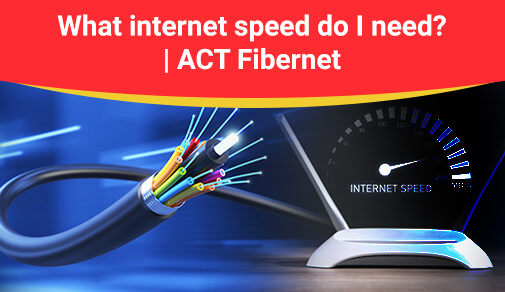How do I decide on the right broadband speed
Saturday, Feb 26, 2022 · 4 minutes


BROADBAND SPEED
Saturday, Feb 26, 2022 · 4 minutes
Not sure how to say if your internet connection is quick enough? Here's how to figure out whether you've got the best idea for you. When shopping for the internet or reviewing your current internet service, internet speed is one of the most important factors to consider, second only to price. However, unlike price, where you can easily see the monthly cost, internet speeds are a little more difficult to judge.
Is 100 Mbps internet considered “fast”? Is 10 Mbps considered “slow”? What kind of internet connection do I have? Many of us have these questions, so we've put together this quick guide to answer them.
Let's take a look at how internet speed is calculated, what constitutes fast internet, what constitutes slow internet, and other considerations that can help you address the question: What is a good internet speed?
The amount of data a link can download (download speeds) or upload (upload speeds) per second determines its internet speed. Internet speeds in the kbps range are considered "slow," whereas Gbps speeds, which are less common but becoming more common, are considered "ultra-fast."
There could be many factors impacting internet speed and we have outlined them here for you.
Your broadband network
ACT Fibernet delivers internet service to your home through fibernet. However, DSL and lower broadband services are usually wired using copper. Most high-speed broadband services deliver internet via a hybrid fiber and copper network. ACT Fibernet provides the internet directly to your home using a 100% fiber network.
Home network
Many factors inside your home can affect the rate at which you send or receive data over the internet. These include:
Connection types
You can connect your home internet through a wired ethernet cable or a wireless connection. Wired cable connections use Cat5e or Cat6 wires connected to the ethernet port on your wall or router. Wired connections give consistent performance and speed. Wireless connections provide you flexibility to move through your home, but they are not as fast as a wired connection. You get the best Wi-Fi signal closest to your router, and, with fewer devices running.
Type and number of devices
All devices have a maximum internet speed they can reach. However, that internet speed may not be as fast as your internet service plan. For example, if your older laptop or mobile only supports 20Mbps and you have 1Gbps internet plan, your laptop will never be able to reach more than 20 Mbps internet speed.
TV and internet speed
In a lot of cases, TV and the internet connections in your home come in through the same cable. Using both services at the same time takes up more available bandwidth and can take a toll on your internet download speeds. For example, watching multiple HD shows at the same time as very high data consumption internet usage, such as downloading a complete HD movie file on your computer, may lead to lower internet speeds as compared with internet speeds when no other uses are happening on your home internet network.
Other networks and websites you visit
Sometimes, the websites you interact with may not provide their services at the same speeds. Things to consider as you surf websites:
In case you are facing issues with your internet connections, you should opt for a fiber optic connection by ACT Fibernet. You can learn more about the plans here.

A referral link has been sent to your friend.
Once your friend completes their installation, you'll receive a notification about a 25% discount on your next bill
![]() Please wait while we redirect you
Please wait while we redirect you

![]() One of our representatives will reach out to you shortly
One of our representatives will reach out to you shortly

One of our representatives will reach out to your shortly
![]() Please wait while we redirect you
Please wait while we redirect you

Please enter your registered phone number to proceed

Please enter correct OTP to proceed


Dear customer you are successfully subscribed
Please wait while we redirect you

Your ACT Shield subscription has been successfully deactivated

Dear user, Your account doesn't have an active subscription

Dear customer Entertainment pack is already activated.
Please wait while we redirect you